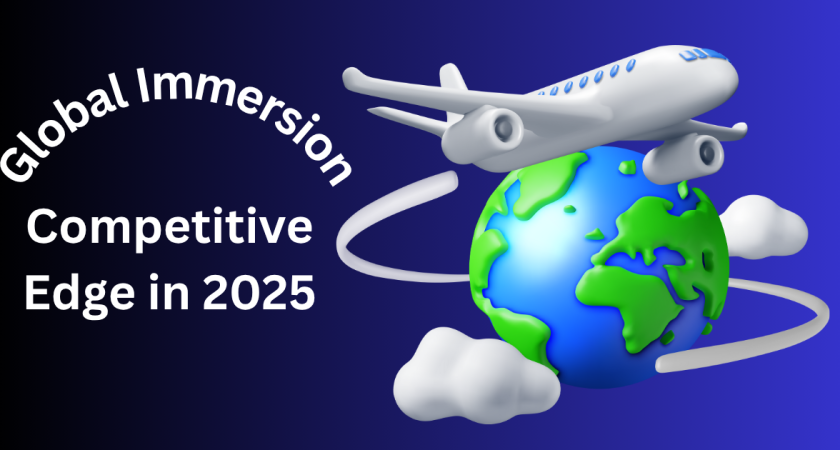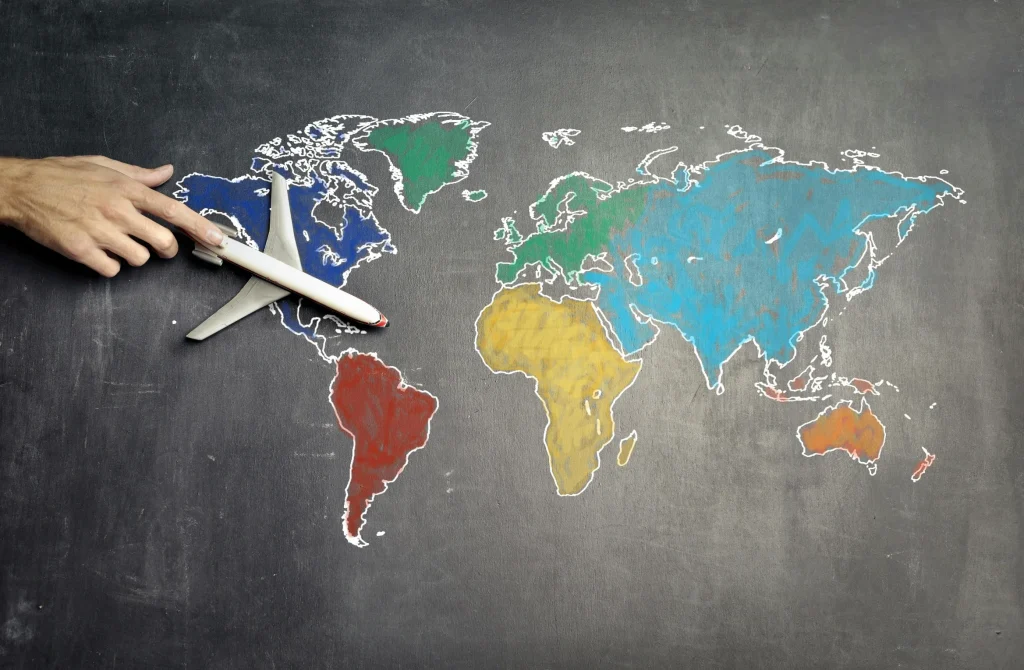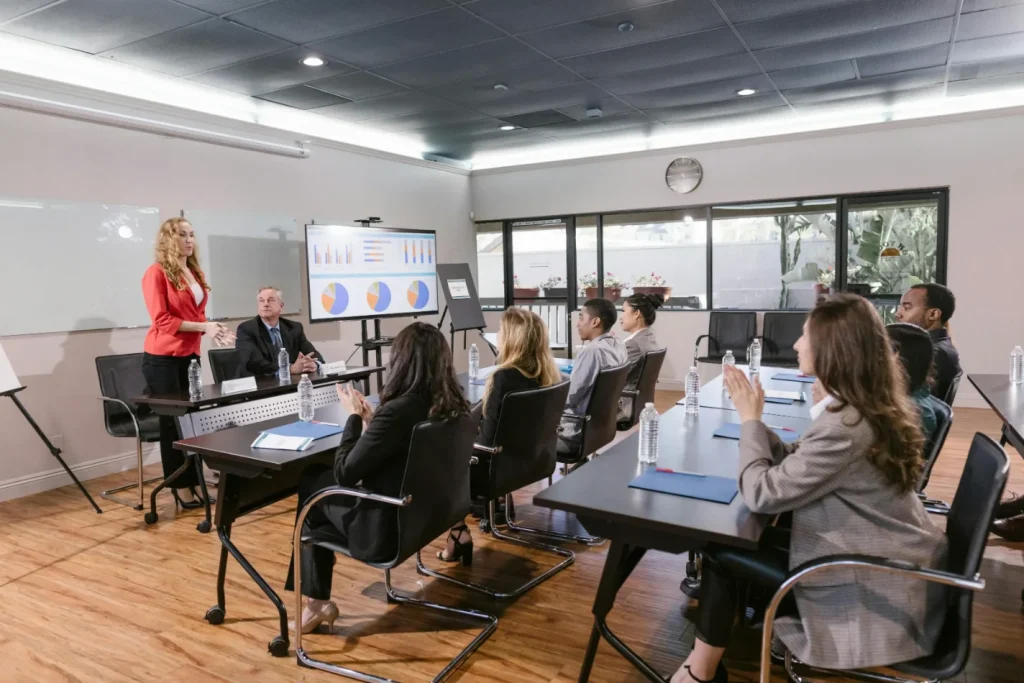Global immersion is an experience that places students or young professionals in a different country, so they can learn hands-on. Unlike traditional classroom study, which is all about rote learning from textbooks and spewing that information into your examination papers, immersion is about stepping into real-world environments and seeing how things actually work beyond borders.
It can include academic sessions at a partner university, visits to international companies, cultural immersion, and collaborative projects with peers from other countries. The primary goal however remains the same – to expose you to new perspectives, cultures, and practical ways people solve problems around the world.
These programs are typically short-term, ranging from a week to a month, but their impact lasts forever. In many cases, participants work on business challenges, engage with startups, attend workshops, and even present ideas to real companies.
Here’s what makes global immersion different:
- It’s active learning: You don’t just learn from books — you learn by doing.
- It’s international: You experience how your subject or field functions in a different part of the world.
- It’s personal growth: Being in a new environment challenges your habits, builds confidence, and expands your worldview.
Employers love this kind of experience because it shows that you’ve worked outside your comfort zone, built relationships across cultures, and taken initiative in unfamiliar settings. In a world where teams, markets, and ideas are more global than ever, these skills are more important than ever.
For students and young professionals, international experience can turn a basic resume into one that’s memorable. It’s a wise investment in your future — no matter what field you’re in.
Why Global Immersion Prepares You for the Modern Job Market
The modern job market values more than academic scores. It rewards individuals who can adapt quickly, communicate effectively, and collaborate across cultures.
Global immersion programs are designed to build exactly those skills — by putting you in real-world situations outside your home country.
Here’s how they help you grow:
- Adaptability: Living and learning in another country pushes you to adjust to new systems, routines, and cultural norms. This flexibility is crucial in workplaces that undergo rapid change.
- Communication: You learn how to collaborate with people from different backgrounds, often in a second or third language. This improves both verbal and non-verbal communication — a massive plus in global teams.
- Problem-solving: You’re not just attending lectures. You’re solving local business challenges, working on case studies, and applying theory in unfamiliar environments.
- Leadership: Most immersion programs involve group work, presentations, and real deadlines. You gain confidence in taking initiative and leading diverse teams — often with limited resources.
- Global awareness: You gain a deeper understanding of how industries operate in different parts of the world. This perspective makes you a more informed and versatile professional.
Resilience and confidence: By stepping outside your comfort zone, you prove to yourself — and future employers — that you can handle the unknown with maturity and grit.
Top 5 Global Immersion Destinations
1. Germany – A Leader in Tech and Innovation
Germany is one of the best places to experience the future of technology up close. Known for its strong engineering, AI, and manufacturing sectors, the country offers immersive exposure to global tech ecosystems.
Here’s How:
- Home to major companies like BMW, Siemens, and SAP
- Top-ranked technical universities and research centres
- Strong focus on sustainability, automation, and clean energy
An excellent choice for STEM, business, and startup-focused students.
German cities like Berlin and Munich blend deep history with a vibrant, modern economy — ideal for students seeking innovation with structure.
2. France – Where Culture Meets Global Business
France offers the perfect mix of tradition and transformation. Known for art, fashion, and cuisine, it’s also a growing hub for finance, design, and entrepreneurship.
Here’s How:
- Primary global business schools in Paris, Lyon, and Nice
- Strong presence of luxury, tech, and green industries
- Opportunities for learning French and working in bilingual settings
An excellent fit for creative fields, international business, and sustainability.
Global immersion in France helps you understand both elegance and efficiency—a unique blend valued across industries.
3. United Kingdom – Academic Excellence and Global Access
The UK has long been a top destination for international students — and for good reason. It combines high-quality education with direct links to the global economy.
Here’s How:
- World-class universities in cities like London, Edinburgh, and Manchester
- Opportunities in finance, policy, media, health, and tech
- A multicultural society with excellent public transport and infrastructure
A natural choice for students in law, politics, business, or healthcare.
With access to internships and global networks, the UK prepares students for leadership on an international scale.
4. Dubai – The Innovation Capital of the Middle East
Dubai is rapidly emerging as a global hub for business and innovation. It’s known for combining futuristic infrastructure with strong opportunities in AI, finance, and sustainability.
Here’s How:
- Gateway to the Gulf region, Africa, and South Asia
- Strong government support for startups and smart cities
- English widely spoken and culturally diverse population
Great for tech, entrepreneurship, and global trade exposure.
Dubai demonstrates how cities can shape the future — making it an ideal destination for forward-thinking students.
5. Singapore – Asia’s Smartest Global City
Singapore is a clean, modern, and deeply connected city. It’s a top choice for students who want a safe, tech-driven, and globally recognised education.
Here’s How:
- A major hub for finance, logistics, biotech, and digital design
- Excellent transport, safety, and quality of life
- Multilingual and multicultural — English is an official language
Perfect for business, data science, urban planning, and innovation careers.
Singapore is where East meets West — and it does so with structure, speed, and success.
Summary Table: Top 5 Global Immersion Destinations
| Country | Focus Areas | Why It Stands Out |
| Germany | Tech, AI, Engineering | Innovation, industry access |
| France | Arts, Luxury, Diplomacy | Culture + global leadership exposure |
| UK | Finance, Policy, Creative Industries | World-class education, career networks |
| Dubai (UAE) | Business, AI, Sustainability | Futuristic, entrepreneurial ecosystem |
| Singapore | Finance, Biotech, Logistics | Efficient, global hub for business + tech |
Taksheela’s 2025 Global Immersion Programs (GIPs)
While many institutions promise global exposure, our Global Immersion Programs (GIPs) truly deliver — blending hands-on learning, academic rigour, and cultural depth into one transformative journey.
In 2025, we ran two major GIPs in Dubai and Germany, where students explored the future of work, tech, and leadership.
In Dubai, sessions at RIT Dubai combined cutting-edge business learning with networking in AI, sustainability, and finance.
Germany offered a deep dive into engineering, innovation, and global thinking at the heart of Europe’s tech scene.
With new Global Immersion Programs launching soon in 2026, Taksheela continues to choose destinations that align with the demands of tomorrow’s job market
Emerging Global Hotspots to Watch
Other than the classic study abroad picks, there are other destinations that are rising as global education hubs. Here are a few of them:
Australia – Sustainability and Global Policy Hub
Australia – Sustainability and Global Policy Hub
- Top destination for climate science, education, public health, and policy
- Strong university-industry ties and multicultural society
Excellent for careers in sustainability, social innovation, and leadership
The Netherlands – Gateway to European Innovation
- Known for clean energy, logistics, and circular economy practices
- English-friendly education system with global business integration
Perfect for fields like green tech, international law, and entrepreneurship
These countries are not just “emerging” — they’re becoming essential. With globally relevant industries, English-friendly programs, and cross-cultural access, these destinations are ideal places to gain experiences that will not just make your resume better than most of your competitors, but also give you a competitive edge for the rest of your life.
The Resume Advantage – What Employers Are Looking For
In a crowded job market, global immersion gives your resume something that can’t be made up — real-world international experience.
You’re not just saying that you travelled there. You are showing employers that you’ve stepped outside your comfort zone, worked with diverse teams, and gained skills that are not limited to the borders of your city, state or country.
Global experience tells employers that:
- You’re adaptable: You’ve worked in unfamiliar environments and learned fast.
- You understand cultural differences: You know how to collaborate across languages, customs, and norms.
- You take initiative: Choosing a global program shows that you have the courage and drive required to excel in a competitive world.
- You’ve built a network: You now have contacts with industries across continents.
- You’ve applied your learning: Business challenges, company visits, and hands-on projects show you’re not just book-smart, but that you know how to apply that knowledge in real world scenarios.
When recruiters see phrases like:
- Developed a solution for an AI-based business challenge in Berlin.
- Worked with X startup during a tech immersion in Dubai.
- Completed cross-cultural leadership training in Singapore.
— they pay attention.
Why? Because these aren’t just buzzwords — they reflect real-world experience and practical skills.
In today’s competitive job market, employers don’t just look at your academic scores. Instead, they look for candidates who’ve faced real global challenges, worked across various cultures, and built the confidence required to lead in unfamiliar environments.
That’s exactly what global immersion helps you do — by turning international exposure into leadership, adaptability, and impact.
Making It Happen
So, how will you choose a program that fits your interests best?
Ask Yourself:
- What skills do I want to build?
- Which industries interest me most?
- Which region matches my ambition?
Choose programs that align with the answers you give.
But how will you figure out which program is good and which isn’t?
These are the characteristics of a well-planned immersion program
- Real-world exposure – Not just lectures but company visits, projects, and challenges
- Academic credibility – Partnered with reputed global universities
- Networking access – Events, mentors, and peers you can grow with
- Cultural depth – Because knowing how to work across cultures is a real-world superpower
When you research programs, make sure that it includes these, so you don’t end up wasting time and money.
Pro Tip:
Don’t wait till graduation. Even short-term programs can transform your confidence, clarity, and career path. Whether it’s two weeks in Berlin or a summer in Singapore, what matters is the things that you learn — and how you apply it.
Because the world isn’t just your classroom.
It’s your launchpad.
Written By Manjul Kathotia.



